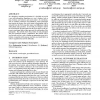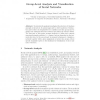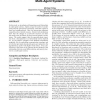17 search results - page 2 / 4 » Representing Excuses in Social Dependence Networks |
WWW
2003
ACM
14 years 6 months ago
2003
ACM
In a ubiquitous computing environment, it is desirable to provide a user with information depending on a user's situation, such as time, location, user behavior, and social c...
INFOCOM
2011
IEEE
12 years 9 months ago
2011
IEEE
—Opportunistic ad-hoc communication enables portable devices such as smartphones to effectively exchange information, taking advantage of their mobility and locality. The nature ...
Publication
State-of-the-art techniques for probability sampling of users of online social networks (OSNs) are based on random walks on a single social relation. While powerful, these methods ...
DFG
2009
Springer
14 years 10 days ago
2009
Springer
Social network analysis investigates the structure of relations amongst social actors. A general approach to detect patterns of interaction and to filter out irregularities is to ...
GECCO
2006
Springer
13 years 9 months ago
2006
Springer
In this study, we investigate self-organizing social hierarchies in multi-agent systems. Agents occupy the nodes of a smallworld network and interact exclusively with other agents...



